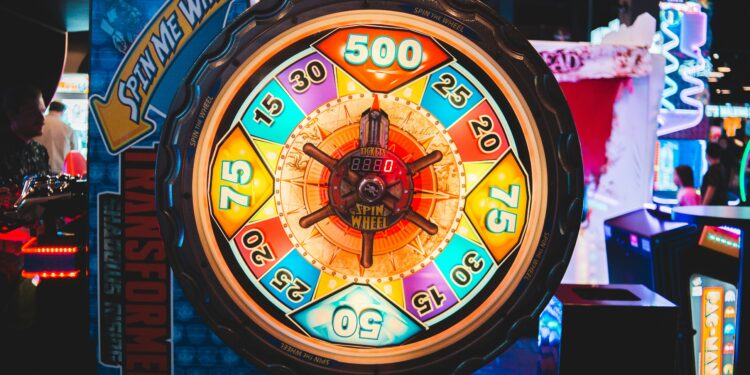The Most Popular Spin the Wheel Games to Play in 2025

There’s something universally thrilling about watching a wheel spin, waiting for it to slow, and holding your breath until it lands on your choice. Whether in classrooms, boardrooms, casinos, or living rooms, spin-the-wheel games have cemented their place in both entertainment and decision-making. The blend of suspense, simplicity, and accessibility has made the spinning wheel game a timeless favorite.
Today, digital platforms and apps have elevated the classic wheel spinner into an engaging tool for gaming, learning, and even productivity. Below, we’ll explore the most popular variations of spin the wheel games in 2025, ranging from party favorites to online RNG-based tools that double as decision makers.
Why We Love Spin the Wheel Games
Part of the appeal of any spin-the-wheel format is psychological. The act of spinning taps into anticipation, randomness, and reward—all drivers of excitement. Unlike dice or coin flips, wheels offer more visual drama, extending the suspense as the arrow clicks past each segment.
This makes spinning wheel games more than chance-based mechanics—they create an emotional experience. From TV shows like Wheel of Fortune to classroom icebreakers, the format offers a universal thrill that’s adaptable to almost any setting.
1. Wheel of Fortune-Style Trivia
One of the most iconic spinning wheel games is, of course, Wheel of Fortune. This game format combines trivia with chance, where each spin dictates the stakes of the player’s word-guessing attempt.
Modern adaptations of this game now appear as digital wheel spinner apps where you can create custom trivia questions. Teachers use these spinners for quizzes, while friends adapt them for themed trivia nights.
2. Classroom Spinning Wheels
Educators have embraced spin-the-wheel mechanics for engagement. Digital spinning wheel games are used to:
- Randomly pick student names.
- Select questions or tasks.
- Gamify participation and reduce bias.
For younger learners, wheels can be decorated with colors, emojis, or rewards, turning mundane lessons into interactive experiences.
3. Casino-Inspired Wheel Games
When people think of a spin the wheel format, many also recall the glamorous casino wheel—bright, oversized, and full of stakes. Popular versions include “Big Six Wheel” or themed live dealer variations offered on digital platforms.
Here, the spin isn’t just a randomizer—it’s a spectacle. The click of the wheel, the flashing lights, and the potential reward all merge into an entertainment package that keeps participants hooked. These versions highlight how wheel games bridge casual fun with high-adrenaline competition.
4. Party Wheel Games
For social gatherings, few activities break the ice like a spin the wheel setup. Party hosts often create DIY wheels (or digital spinners projected on a screen) with options like:
- “Truth or Dare” challenges.
- Mini drinking game prompts.
- Silly dares or rewards.
The randomness keeps the energy high and ensures everyone gets involved. Unlike rigid board games, spinning wheels offer endless customization for each group’s mood.
5. Decision Maker Spinners
In the digital age, wheels aren’t just for fun—they’re practical tools. Many people use wheel spinners as decision makers when choices feel overwhelming. For example:
- “Where should we eat tonight?”
- “Which project should I tackle first?”
- “What workout should I do today?”
This playful use of RNG (random number generation) transforms indecision into entertainment, making daily choices feel lighter.
6. Fitness and Lifestyle Wheels
Spin the wheel has also made its way into wellness and fitness. Online tools and mobile apps let users create workout wheels, diet wheels, or habit trackers. For example:
- Spinning for a random exercise (push-ups, squats, planks).
- Choosing a self-care ritual.
- Picking a journaling prompt.
By turning healthy routines into spinning wheel games, people gamify lifestyle changes and add an element of fun to self-discipline.
7. Online Multiplayer Wheel Games
As social gaming expands, multiplayer-friendly wheel spinners are gaining traction. Players connect remotely, share a virtual wheel, and compete or collaborate in real-time. These spinners often include chat integration or video call features, blending the unpredictability of chance with the social experience of gaming together.
Platforms like Tabletopia or Jackbox-inspired setups now offer spin the wheel elements within broader digital party games, ensuring wheels remain part of evolving online play.
The Role of RNG and Fairness
Modern digital spinning wheel games rely heavily on RNG (random number generators) to ensure fairness. Whether for casual play, education, or even casino environments, players expect transparency and trust in the randomness.
Developers now often showcase fairness algorithms, so users know the wheel isn’t rigged. This attention to digital trust is why wheels have found their way into so many settings, from classrooms to streaming platforms.
Customization: The Key to Spin the Wheel’s Popularity
What makes the spinning wheel game so adaptable is customization. Today, users can design wheels with:
- Custom colors and themes.
- Emojis or images.
- Personalized text prompts.
This flexibility has kept spin the wheel mechanics fresh. Whether it’s a teacher gamifying a lesson, a Twitch streamer engaging their audience, or a fitness enthusiast randomizing a workout, the wheel adjusts to nearly any context.
Cultural Presence of Spinning Wheels
The popularity of spin the wheel extends beyond games—it’s a cultural icon. From reality TV competitions to giveaway promotions on Instagram, the wheel represents fairness and anticipation. Even businesses use spinning wheels in loyalty programs or prize giveaways to encourage customer engagement.
This cultural versatility explains why the spinning wheel continues to dominate both analog and digital spaces, adapting to modern technologies while retaining its age-old charm.
The Future of Spin the Wheel Games
Looking forward, the spin the wheel format is likely to evolve further:
- AR and VR Wheels: Imagine spinning a 3D wheel in virtual space during a VR party.
- AI-Powered Wheels: Personalized outcomes based on user data and preferences.
- Social Media Integration: Wheels embedded into live streams or interactive posts.
As tech blends entertainment and daily life, wheels will remain both practical and fun, bridging chance with engagement.
Why Wheels Keep Spinning
From trivia nights to classrooms, casinos to mobile apps, the spin the wheel mechanic has proven timeless. Its universal appeal lies in its blend of randomness, suspense, and visual drama. Whether you’re using a digital wheel spinner as a decision maker or gathering friends around a spinning wheel game, the format creates connection, anticipation, and fun.
In 2025, the spinning wheel continues to thrive because it does more than randomize—it transforms ordinary decisions into unforgettable moments. And as customization, technology, and social gaming expand, spin the wheel formats are only set to become more creative, immersive, and essential in our everyday lives.








